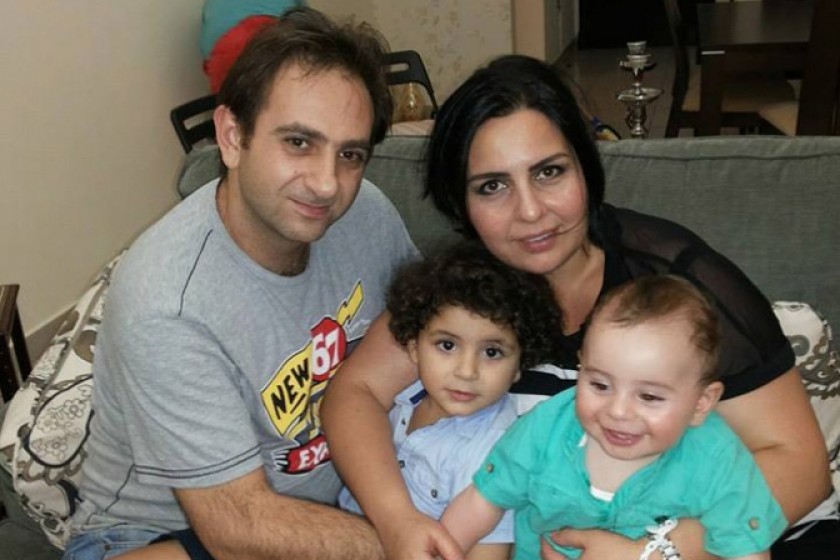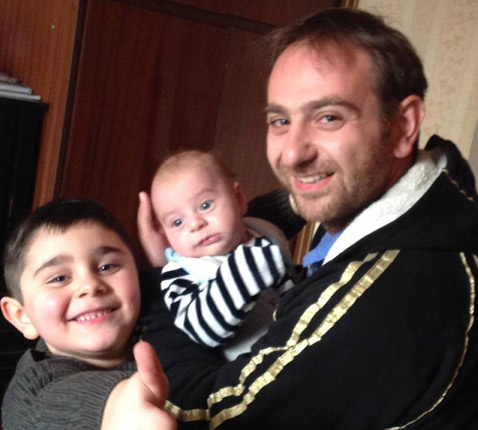
Syrian-Armenian Simon Hamamdjian: ‘There were always problems about the way I dressed and talked’
Gayaneh Sargsyan
I met Syrian-Armenian Simon Hamamdjian and his wife Datevik in their rented apartment in Vanadzor, a town in northern Armenia.
Datevik and her two children relocated from Syria three years ago. She says that the family was on the last flight out of Aleppo.
Datevik is a native of Armenia who married Simon in 2006 and moved to Aleppo with him.
“Syria TV was like Soviet broadcasts. They kept saying that the problem would pass and there was no need for alarm,” Datevik says.
Her husband Simon and his brother’s family were able to come to Armenia a year later.
“We always thought of selling our business in Syria and returning to Armenia. We thought of buying land and a house over time. But we never thought it would be like this, of leaving everything behind,” Datevik says.
The Hamamdjian brothers, who had a small factory producing plastic parts, were forced to take any work that came their way in Armenia.
Simon worked at several places in Yerevan but he couldn’t accept the low wages and negative attitudes towards Syrian-Armenians he encountered.
“There were always problems about the way I dressed and talked. They would tell me to get a haircut and not wear certain clothes. It’s not a big deal, but for someone who has lost everything and has relocated to the homeland, such attitudes are psychological pressure. They should at least raise wages,” Datevik complains.
There’s much about Armenia that Simon and his friends from Syria do not understand – Why a 21 year-old director here talk addresses him, someone who supervised tens of workers back in Aleppo, as “Ara”; why people talk using Russian words when the official language is Armenian; why people don’t say “Excuse me” when they are wrong; and why people love to fight to settle scores.
“He’d say, he lived amongst the Arabs for so many years and still spoke literary Armenian, western Armenian, so why do they talk like this in Armenia,” says Datevik.
Simon also doesn’t understand the attitude of some local Armenians regarding women. “Syrian-Armenians respect women very much. He couldn’t understand how, when sitting with his friends, a husband could yell at his wife to bring this or that,” says Datevik.
Since Simon could do little to change local customs, he had to either leave Armenia or adapt. For now, Simon has decided to leave after receiving a job offer in the UAE.
 “After being displaced once, you really don’t want to pack up and leave for somewhere else. But I cannot survive here any longer. If only we had half as much as we had in Syria. We have the kids to think about,” says Datevik.
“After being displaced once, you really don’t want to pack up and leave for somewhere else. But I cannot survive here any longer. If only we had half as much as we had in Syria. We have the kids to think about,” says Datevik.
8 year-old Garo still remembers his room in Aleppo and his first teacher. Garo says that sometimes he sees it all in his dreams.
The couple’s second child was born in Armenia. The Vanadzor Municipality assisted with cash and food. Nevertheless, the couple never expected such assistance.
“Armenia is a small country and very unstable in all ways. What can I expect? If people born in Armenia cannot find work, how can they assist those from coming from overseas?” asks Datevik.
She says that her husband’s brother wanted to set up a plastics shop in Armenia just like they had in Syria, but that the family wasn’t permitted to operate the business.
“They came and said to close the place down. Short and simple,” says Datevik.
The Hamamdjian family doesn’t know what the future holds for them.
“I hoped that the situation in Syria would get calm enough for me to go back and remove some necessities. That hope no longer exists. It’s like we never owned anything before. I try not to think about what will happen later,” Datevik says.
 Videos
Videos Photos
Photos




Comments (3)
Write a comment